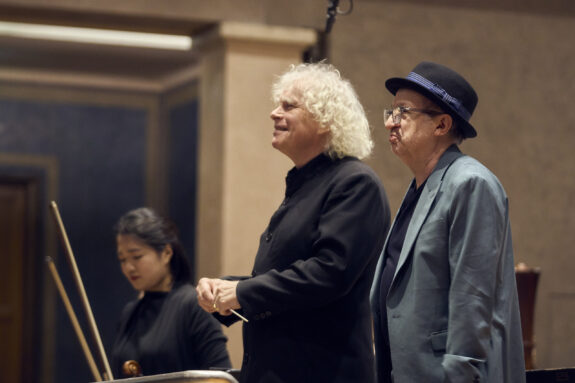 Germany Turnage, Brahms: Lucy Crowe (soprano), Michael Nagy (baritone), Bavarian Radio Chorus, Bavarian Radio Symphony Orchestra / Sir Simon Rattle (conductor). Herkulessaal, Munich, 14.2.2025. (ALL)
Germany Turnage, Brahms: Lucy Crowe (soprano), Michael Nagy (baritone), Bavarian Radio Chorus, Bavarian Radio Symphony Orchestra / Sir Simon Rattle (conductor). Herkulessaal, Munich, 14.2.2025. (ALL)

Mark-Anthony Turnage – Remembering
Brahms – Ein deutsches Requiem, Op.45
Written in memory of Evan Scofield, son of jazz guitarist John Scofield, and created in 2017 by Sir Simon Rattle, Mark-Anthony Turnage’s Remembering is a work in four movements. In the first three, as often is the case with many contemporary works, rhythms are exciting and the orchestration is quite original, but there are passages where the musical line is not always easy to perceive.
Then comes the last movement which is quite extraordinary. It starts with pensive solos on the viola and then on the cello (superb Emiko Yuasa and Hanno Simmons) before building up to a powerful tutti, dramatic and full of rare emotion. Suddenly, we perceive the weight of a beloved person’s absence. It is a profound and very moving passage – and a superb discovery.
The first movement of Brahms’s German Requiem, ‘Selig sind, die da Leid tragen’ has in common with Turnage’s work that it is orchestrated with violins. The orchestra and choir are in their element. One can appreciate the clarity, balance, and colours of the orchestral music. The Bavarian Radio Choir is superb in dynamics and amplitude, something we have come to expect of them. But on too many occasions, the lively tempos chosen by Rattle are surprising. This is not a light oratorio; the composer wrote his Requiem on the occasion of his mother’s death. The soprano aria ‘Ihr habt nun Traurigkeit’ is the pivot of this work, which starts with dark colours and gradually returns toward the light. Rattle’s conception does not convey this at all.
Unusually for her, soprano Lucy Crowe took a moment to find her true voice. The first phrase, which rises ‘only’ to a G, lacked serenity and was strained. In contrast, baritone Michael Nagy found the dimension of his part and the authority that music and text demand.
As the temp relaxed, expression and alignment with the text became stronger. The finale, ‘Selig sind die Toten’, with superb playing by oboist Ramón Ortego Quero, was more moving. Even after such a bold and dramatic first part, the contrast to the second should not have been so considerable. But both approaches work in the end, explore the passing of loved ones and are close in spirit.
Antoine Lévy-Leboyer
